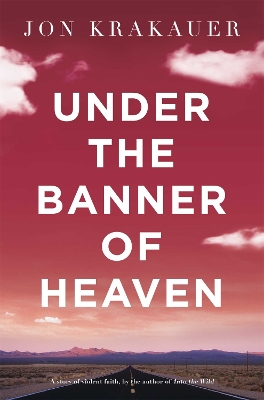
Now a major new series on Disney+ starring Andrew Garfield
A provocative look at the twisted roots of American fundamentalism.' Will Self, Evening Standard Books of the Year
‘Excellent . . . a lucid, judicious, even sympathetic account not just of Mormon Fundamentalism but of the seductive power of fanaticism in general.’ Daily Telegraph
‘Remarkable . . . for anyone interested in the wilder frontiers of spiritual conviction, this book is a must.’ Independent
Brothers Ron and Dan Lafferty insist they were commanded to kill by God. In Under The Banner of Heaven, Jon Krakauer's investigation is a meticulously researched, bone-chilling narrative of polygamy, savage violence and unyielding faith: an incisive look inside isolated Mormon Fundamentalist communities in America, this gripping work of non-fiction illuminates an otherwise confounding realm of human behaviour.
- ISBN10 0330419129
- ISBN13 9780330419123
- Publish Date 1 July 2011 (first published 1 July 2003)
- Publish Status Active
- Out of Print 4 March 2021
- Publish Country GB
- Publisher Pan Macmillan
- Imprint Pan Books
- Edition Unabridged edition
- Format Paperback (B-Format (198x129 mm))
- Pages 432
- Language English
Reviews


pamela
The current, mainstream LDS reaction to church history is usually to claim that most accurate tellings of the founding of the Mormon religion are 'anti-Mormon' literature. They actively discourage members from delving too deeply into any historical research. Recently, however, with the publishing of official essays on Church history, they have attempted to address these issues in a world where information is increasingly right at our fingertips.
What really struck me about Jon Krakauer's Under the Banner of Heaven was his complete lack of judgement. When writing about a double murder, child abuse, spousal abuse, and religious fundamentalism, it's easy to become emotional and angry in your writing style. Krakauer, however, remains an impartial writer, presenting the facts as they appear, whether it be from the mouth of the victims or the perpetrators. Even Mormon history he offers as a matter of fact, rather than lending any emotional indignation to the founding of the LDS church. The early Mormons do not come across as blameless in some of the atrocities they perpetrated in the founding of their church, but then neither do the early Americans, who committed equally horrendous crimes against the Mormons. I found it quite refreshing. These topics can be quite emotionally charged.
What really struck me, was how Krakauer just understood what was relevant, and conveyed it in a way that can appeal to every reader. He understands what it is to be driven by faith and does not judge it. He also understands the pain and emotional trauma that comes with leaving one's faith. But where this book really shines is in its study of the rationality of faith. To outsiders, the Lafferty murders seem to be the product of madness. Two men truly believe, without regret, that they were instructed by God to kill a woman and her baby. When it comes to prosecuting, however, it raises all kinds of question about madness vs. belief. Just because faith turns violent, does that make it a product of insanity? And if you apply insanity to it does it then, by extension, mean that all religious faith is a product of insanity? When is faith mad, and when is it rational? Neither I nor this book professes to have those answers.
“How can a society actively promote religious faith on one hand and condemn a man for zealously adhering to his faith on the other?”I can't recommend this book highly enough. It was deep, truthful, thoughtful and for me at least, highly personal.
I will leave you with the parting words of a fundamentalist apostate. Like so many of us who leave our faiths, we go through a period of questioning, confusion, and indeed, unhappiness while we find ourselves in a world that essentially has a far different reality to the one in which we grew up. “But some things are more important than being happy. Like being free to think for yourself.” To all of you struggling with your faiths out there, I promise, the unhappiness of uncertainty will pass. The ability to think for yourself is well worth the uncertainty you will face.

Whitney @ First Impressions Reviews
To better understand these motives Jon Krakauer, the author flip-flops between the heinous, unbelievable actions of 1984 and the creation of the Mormon religion and its prophet, Joseph Smith. Discovering the golden plates and the start of the religion was very interesting but the disturbing subject of polygamy and how Fundamentalists behave then and now is what really set the story apart. On the first pages Krakauer describes Colorado City, a polygamy commune, he implies that the residents have been brainwashed that, tv is the devil's work and poo-poo the United States government, yet they collect welfare and see it as a gift from God, in short, sticking it to the man. How do they collect from this government program? Fundamentalists are legally only married to one wife, with the Sister Wives being "married" in a spiritual ceremony and are considered single mothers, and when you've married forty wives, with ten kids a piece... well you do the math. I could go on about this strange quality of living but it may be disrespectful. Although, I will say that my dad drove by the town and it was filled with gigantic homes to fit their large families and the town itself was deserted, almost like a ghost town with an eerie feel.
Growing-up, my brother had a friend who is a member of Latter Day Saints and I remember him telling us that he had once gotten stuck in a basketball hoop, and God talked to him and helped him through it. I was probably ten at the time and instead of thinking speaking to a higher being was strange, I thought getting stuck in a basketball hoop was even weirder. Obviously, not all persons in believe in some sort of spiritual being are told to marry a fourteen year or kill innocent people. Should all persons who pray, or speaks to God be considered crazy? No, we all need something to believe in, even atheists.
At the end of the novel, Warren Jeffs is the main topic of conversation with members of the sect even thinking he was too extreme. (Of course all of this was written before the shit hit the fan). I feel that this novel will always be timely after have been writing in 2003, as it is still going on today.

ibeforem
When my husband read the book, he thought it was about how Mormonism as a whole is a bad faith. That wasn’t the impression I got from it. The impression I got was that Krakauer was pointing out the bad in fundamentalism. And fundamentalism is bad in *any* religion. The Mormons are certainly not the first faithful to spill blood in the name of their god. I was a little disappointed that the book didn’t really address today’s mainstream Mormonism at all, which is an entirely different animal. I felt he was a little disengenous by leaving that out, because most people are going to read the book and come out with the equation “Mormons = EVIL!!”, which really is not true. Not unless “Catholics = EVIL!!” because the Crusades happened x number of years ago, or “Protestents = EVIL!!” because they burned a bunch of women they thought were witches x number of years ago.
